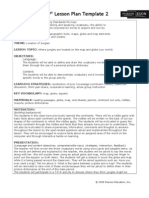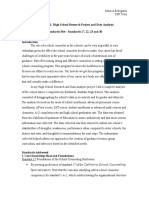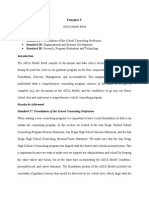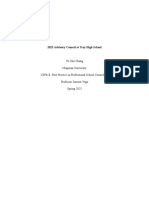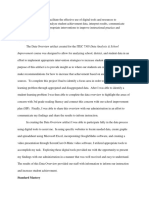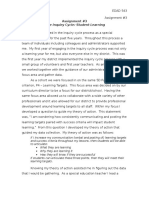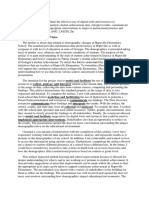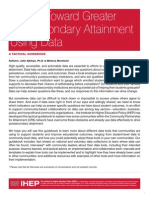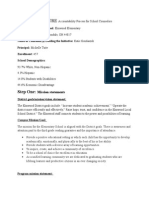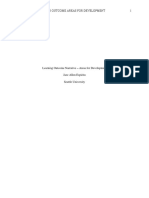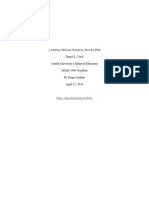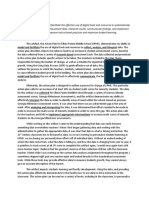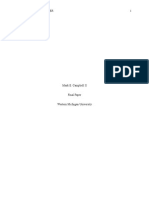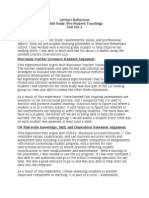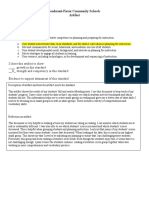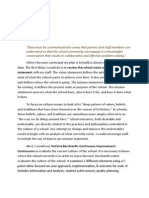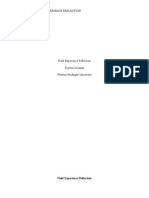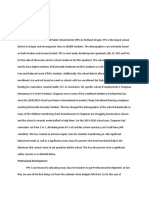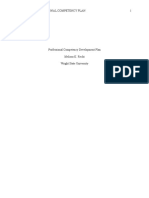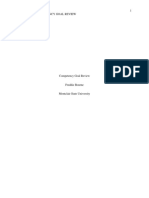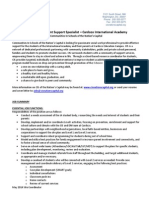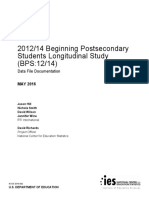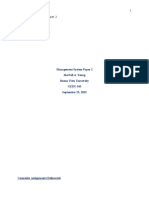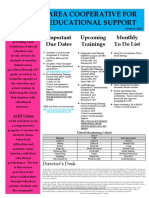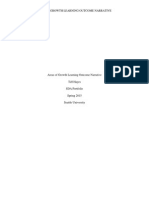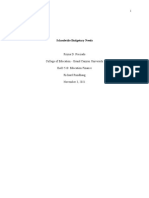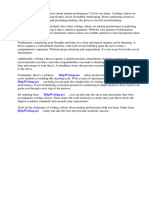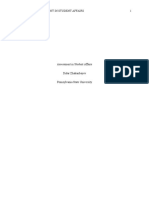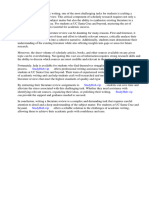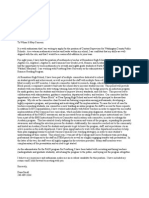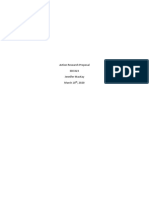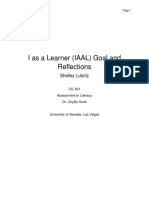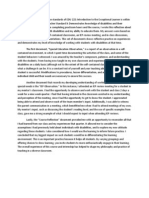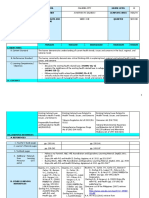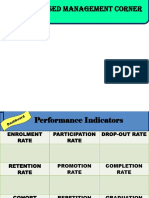Exemplar 2
Exemplar 2
Uploaded by
api-252309583Copyright:
Available Formats
Exemplar 2
Exemplar 2
Uploaded by
api-252309583Original Title
Copyright
Available Formats
Share this document
Did you find this document useful?
Is this content inappropriate?
Copyright:
Available Formats
Exemplar 2
Exemplar 2
Uploaded by
api-252309583Copyright:
Available Formats
LeLycia Henderson Exemplar #2: Data Analysis Project CSP 769: Leadership, Advocacy, and Systemic Change, Fall
2013 Data Analysis of Sweetwater High School Compared to District and State Standards Addressed: 17& 23
According to the American School Counselor Association (ASCA), data analysis is a central component of developing and implementing a comprehensive school counseling program (ASCA, 2014). As a future school counselor, it is important that I acquire the skills necessary to accurately execute data collection, disaggregation, and analysis so that I am an effective school counselor. In CSP 769, I was required to collect student progress data at my fieldwork site and compare it to district, state, and comparison school data. I collected data on student A-G completion rates, graduation rates, SAT and ACT passage rates, college going rates, etc. In addition, I disaggregated the data within these different data components based on student ethnicity, gender, grade level, etc. Through my analysis of these different data points and disaggregating the data, I was able to identify which student populations were in need of interventions and make appropriate recommendations to close the identified achievement gaps. Lastly, I developed a PowerPoint presentation based on the data analysis and presented it during class. I chose to highlight this project because it demonstrates my development in overall data comprehension. Throughout the process of completing this assignment, I learned how to accurately collect, analyze, and interpret data for the purposes of student advocacy. Furthermore, I was able to develop recommendations for future intervention implementations that could assist in closing achievement gaps within the school population.
LeLycia Henderson Standard 17: Foundations of the School Counseling Profession Throughout the process of completing the data project, I gained a firm grasp on the foundational bases in which school counseling practices are built. I learned that counseling interventions should never be randomly selected. Instead, interventions should be based on data results that indicate a particular need. For example, through my data analysis, I determined that the A-G completion rate of the Latino population at my fieldwork site was lower than non-Latinos students. This knowledge led me to recommend a research based curriculum proven effective for Latino academic achievement. While completing the assignment, I completed research on the progression of student academic achievement and gained a firm understanding of achievement gap trends. This helped me to further understand theoretical bases of school counseling practices. With that foundational knowledge, I determined which of the ASCA National Model Standards attribute to closing the achievement gap. For example, when verifying that my school site had lower postsecondary entrance rates than the district and state, it was clear to me how important college and career readiness interventions are within the school counseling profession. Standard 23: Advocacy The entire theoretical reasoning of data collection, analysis, and interpretation is student advocacy. While completing this project, I used data to identify the achievement gaps present within my fieldwork site student population and develop recommendations of ways to close those gaps. For example, my data analysis of SAT passage rates revealed an achievement gap between Latino and non-Latino students at my fieldwork site. I found
LeLycia Henderson that non-Latino students had higher SAT passage rates than Latino students. In order to address this issue, I recommended an increase in SAT prep resources at the school site. After analyzing the data from my fieldwork site compared to the district and state, I noticed that there was a large gap between my school site AP test passage rates and the state and district. This caught my attention because there had been a major increase of AP enrollment at my school but the passage rates pointed to a need for more support. Therefore, I advocated for students by recommending that AP test prep workshops be incorporated into AP course curriculum. Conclusion: Through my completion of this data project, I acquired a plethora of knowledge and skills necessary for effective school counseling practices. I learned about a variety of websites and databases that I can use to access student progress data such as Dataquest, district websites and Power School. During my career as a professional school counselor, I will use these tools to learn more about the academic standing of my school population. The data I collect will always guide my intervention implementations. In addition, I will use data collection to determine which interventions are effective and which need to be adjusted. If given the opportunity to complete this assignment again, I would try to collect more current data results so that my analysis can have more accuracy. In some cases, I only had access to data that was out of date. Finding more resources for data collection would ensure that my recommendations are based on current student need. Overall, participating in the various elements of this assignment helped me to grow fundamentally as a future school counselor. With the experience I gained through this process, I feel more confident in my ability to develop and implement a comprehensive school counseling program.
You might also like
- Siop Lesson Plan Template2Document2 pagesSiop Lesson Plan Template2api-202003924100% (2)
- Class 7 - TERM 1-Worksheet-1-With AnswersDocument2 pagesClass 7 - TERM 1-Worksheet-1-With AnswersAkuliya Polimari100% (3)
- Emcee ScriptDocument7 pagesEmcee ScriptMares Respecia MaglasangNo ratings yet
- Mauriello Resume OkinawaDocument6 pagesMauriello Resume Okinawaapi-94382759No ratings yet
- Exemplar 1Document4 pagesExemplar 1api-315905890No ratings yet
- Competency 2 AccountDocument4 pagesCompetency 2 Accountapi-283430825No ratings yet
- Exemplar 5Document3 pagesExemplar 5api-283084331No ratings yet
- 2023 Advisory Council at Troy High SchoolDocument6 pages2023 Advisory Council at Troy High Schoolapi-664208920No ratings yet
- Alfonso Amy Reflection Standard2.8Document3 pagesAlfonso Amy Reflection Standard2.8ah2maxNo ratings yet
- Capstone Portfolio-Year 3 Reflection Jparker May6 Final v2Document27 pagesCapstone Portfolio-Year 3 Reflection Jparker May6 Final v2api-231469652No ratings yet
- Kjohnsonaction Research - Rationale Paper 2Document7 pagesKjohnsonaction Research - Rationale Paper 2api-301971398No ratings yet
- Standard 5 ReflectionDocument2 pagesStandard 5 Reflectionapi-315190146No ratings yet
- Edad543 Assignment3 WalserDocument5 pagesEdad543 Assignment3 Walserapi-334954287No ratings yet
- 6 Reasons It's Important To Create Your Own Online AssessmentsDocument3 pages6 Reasons It's Important To Create Your Own Online AssessmentsSaliza ShamsudinNo ratings yet
- 2.8 Data AnalysisDocument2 pages2.8 Data Analysisapi-370169875No ratings yet
- IHEP Final VersionDocument58 pagesIHEP Final VersionFrankChiNo ratings yet
- Alexandra Penn's ApplicationDocument19 pagesAlexandra Penn's ApplicationThe Florida Times-UnionNo ratings yet
- Measure - ElmwoodDocument5 pagesMeasure - Elmwoodapi-257829203No ratings yet
- Learning Outcomes Narrative - Areas For Development FinalDocument7 pagesLearning Outcomes Narrative - Areas For Development Finalapi-310924257No ratings yet
- Daniel Nash's SDA Learning Outcome NarrativeDocument24 pagesDaniel Nash's SDA Learning Outcome NarrativeDaniel NashNo ratings yet
- 2.8 Data AnalysisDocument2 pages2.8 Data Analysisapi-405559723No ratings yet
- Edld 6548 Final Paper 1eDocument8 pagesEdld 6548 Final Paper 1eapi-283334754No ratings yet
- Child Study (Pre-Student Teaching)Document2 pagesChild Study (Pre-Student Teaching)MelomiJoyNo ratings yet
- Driving Toward Greater Postsecondary Attainment Using Data (Complete PDFDocument58 pagesDriving Toward Greater Postsecondary Attainment Using Data (Complete PDFInstitute for Higher Education Policy100% (1)
- Iowa Teaching Standard #5 - Uses A Variety of Methods To Monitor Student LearningDocument1 pageIowa Teaching Standard #5 - Uses A Variety of Methods To Monitor Student Learningapi-297195256No ratings yet
- Karpinski Aryn CDocument531 pagesKarpinski Aryn CLebohang Anna SempeNo ratings yet
- Bondurant-Farrar Community Schools Artifact Artifact Title: Areading DataDocument1 pageBondurant-Farrar Community Schools Artifact Artifact Title: Areading Dataapi-306957249No ratings yet
- Data Board InquiryDocument16 pagesData Board InquirylynjonesNo ratings yet
- Research Paper On Classroom SizeDocument8 pagesResearch Paper On Classroom Sizekpyjdfhkf100% (1)
- Schlumpf Data Culture PlanDocument4 pagesSchlumpf Data Culture PlanGlenn E. Malone, Ed.D.No ratings yet
- Hilldorfer Capstone PaperDocument7 pagesHilldorfer Capstone Paperapi-283602689No ratings yet
- Uconn Dissertation FellowshipDocument8 pagesUconn Dissertation FellowshipBuyAPaperUK100% (1)
- 2 8 WishonDocument1 page2 8 Wishonapi-259399200No ratings yet
- Coleman Final PaperDocument8 pagesColeman Final Paperapi-279806796No ratings yet
- Self Assessment of Final PracticumDocument3 pagesSelf Assessment of Final Practicumapi-417544594No ratings yet
- Hilldorfer Final+paper AssessmentsDocument8 pagesHilldorfer Final+paper Assessmentsapi-283602689No ratings yet
- Altiero Holly Equity AuditDocument9 pagesAltiero Holly Equity Auditapi-513430984No ratings yet
- Saa 7600 Professional Competency Development PlanDocument6 pagesSaa 7600 Professional Competency Development Planapi-340802012No ratings yet
- Bourne - Goals - 07 May 2018Document6 pagesBourne - Goals - 07 May 2018api-406691709No ratings yet
- SPSS CardozoDocument3 pagesSPSS CardozoOffice on Latino Affairs (OLA)No ratings yet
- Cspel 2 Narrative SummaryDocument5 pagesCspel 2 Narrative Summaryapi-377039370No ratings yet
- Assessmenta Resourceexploration RpowellDocument10 pagesAssessmenta Resourceexploration Rpowellapi-447068134No ratings yet
- Assessmenta Resourceexploration RpowellDocument10 pagesAssessmenta Resourceexploration Rpowellapi-447068134No ratings yet
- Standard2 8 Courtney Carver Itec7500 w03 17Document1 pageStandard2 8 Courtney Carver Itec7500 w03 17api-338504614No ratings yet
- Competency Reflections: Mrs. F. ThompsonDocument7 pagesCompetency Reflections: Mrs. F. Thompsonapi-285174981No ratings yet
- Beginning Postsecondary Students Longitudinal StudyDocument671 pagesBeginning Postsecondary Students Longitudinal StudyAneudy MotaNo ratings yet
- Management System Paper 2Document8 pagesManagement System Paper 2api-340244643No ratings yet
- Reflection 3Document2 pagesReflection 3api-288004986No ratings yet
- October 2016 Aces NewsletterDocument2 pagesOctober 2016 Aces Newsletterapi-83101465No ratings yet
- Areas of Growth Learning Outcome NarrativeDocument8 pagesAreas of Growth Learning Outcome NarrativeTiff HayesNo ratings yet
- Jana Brewer: Not An Acceptable Response.)Document2 pagesJana Brewer: Not An Acceptable Response.)api-508724587No ratings yet
- Ead 510 - Clinical Field Experience B - Schoolwide Budgetary NeedsDocument6 pagesEad 510 - Clinical Field Experience B - Schoolwide Budgetary Needsapi-578761151No ratings yet
- Thesis About Students PerformanceDocument8 pagesThesis About Students Performanceelizabethandersonlittlerock100% (2)
- R. Watford DLP Assignment 1Document22 pagesR. Watford DLP Assignment 1rtwatforNo ratings yet
- Didar Zhakanbayev - Assessment in Student AffairsDocument5 pagesDidar Zhakanbayev - Assessment in Student Affairsapi-300282801No ratings yet
- Uc Santa Cruz How To Write A Literature ReviewDocument4 pagesUc Santa Cruz How To Write A Literature Reviewea84k86s100% (1)
- The Importance of Data-Based Decision Making: VignetteDocument11 pagesThe Importance of Data-Based Decision Making: VignetteJoviner Yabres LactamNo ratings yet
- Cover Letter Dana Small PracticumDocument1 pageCover Letter Dana Small Practicumapi-292126567No ratings yet
- Course SynthesisDocument6 pagesCourse Synthesisapi-480758081No ratings yet
- Portfolio - Action Research-Jennifer MackayDocument8 pagesPortfolio - Action Research-Jennifer Mackayapi-502451543No ratings yet
- Ed 695b Reflection - BrunsgaardDocument7 pagesEd 695b Reflection - Brunsgaardapi-477606437No ratings yet
- IAAL Part 2Document6 pagesIAAL Part 2Shelley LubritzNo ratings yet
- Crtiteria For Selection of EvaluationDocument4 pagesCrtiteria For Selection of EvaluationAparna KinginiNo ratings yet
- Characteristics of Dyslexia PDFDocument3 pagesCharacteristics of Dyslexia PDFDaniel Garzia Aizrag100% (2)
- English 8 Q3 M8Document14 pagesEnglish 8 Q3 M8Aiza PentinioNo ratings yet
- Accomplishment Report Gulayan Sa PaaralanDocument5 pagesAccomplishment Report Gulayan Sa PaaralanAnalyn Ewican JalipaNo ratings yet
- SDP ApplicationDocument10 pagesSDP ApplicationDonald CageNo ratings yet
- DLL - English 6 - Q2 - W3Document4 pagesDLL - English 6 - Q2 - W3hakfohNo ratings yet
- Practicum Evaluation Form MHC - Cianna Toms FinalDocument6 pagesPracticum Evaluation Form MHC - Cianna Toms Finalapi-316744816No ratings yet
- Julia Elizabeth Ditomasso Education: School Counseling Intern (Practicum)Document2 pagesJulia Elizabeth Ditomasso Education: School Counseling Intern (Practicum)api-283478268No ratings yet
- Cambridge Secondary 1 English Curriculum FrameworkDocument4 pagesCambridge Secondary 1 English Curriculum FrameworkYasmine SamirNo ratings yet
- S.No. Roll No. Topics: Holiday Homework English Class-Xii Project ReportDocument3 pagesS.No. Roll No. Topics: Holiday Homework English Class-Xii Project ReportGaurav ChaudharyNo ratings yet
- Financial Literacy For Kids & ChildrenDocument8 pagesFinancial Literacy For Kids & Childrensapna agrawalNo ratings yet
- Lesson Plan Labelling PDFDocument3 pagesLesson Plan Labelling PDFMiguel Angel PonzeNo ratings yet
- Week 5Document51 pagesWeek 5Melissa MorrisNo ratings yet
- Critical Thinking and Reflective Practices (8611) Assign No 1Document15 pagesCritical Thinking and Reflective Practices (8611) Assign No 1Njay StudioNo ratings yet
- FS 1 Episode 6Document4 pagesFS 1 Episode 6Elmer Ativo100% (4)
- 3 Idiots Reflection PaperDocument2 pages3 Idiots Reflection Paperjeemer100% (2)
- Learning Disability CollectionDocument40 pagesLearning Disability Collectionchimp-detectiveNo ratings yet
- School of Graduate Studies, UPM - TakwimDocument2 pagesSchool of Graduate Studies, UPM - TakwimNormaziah HanafiNo ratings yet
- Edu 222 Reflection PortfolioDocument1 pageEdu 222 Reflection Portfolioapi-234974062No ratings yet
- Summary of Ipcrf: Content Knowledge and PedagogyDocument4 pagesSummary of Ipcrf: Content Knowledge and PedagogyJhay B. MagtibayNo ratings yet
- Research I 4th Quarter Exam TOSDocument1 pageResearch I 4th Quarter Exam TOSMarjorie SanchezNo ratings yet
- 1b Soft Skills ContohDocument24 pages1b Soft Skills ContohIka Suci MukhlisaniNo ratings yet
- ALMON WHLP Quarter 2 Week 2Document5 pagesALMON WHLP Quarter 2 Week 2Mark AtentarNo ratings yet
- Program Book FinalDocument46 pagesProgram Book Finalapi-253515287No ratings yet
- Q2 Grade 10 HEALTH DLL Week 1Document14 pagesQ2 Grade 10 HEALTH DLL Week 1Jesabelle San Juan100% (1)
- Prof Ed Hot QuestionsDocument119 pagesProf Ed Hot QuestionsJoshua AlibanNo ratings yet
- Tarp - SBMDocument8 pagesTarp - SBMJohn Dale EvangelioNo ratings yet
